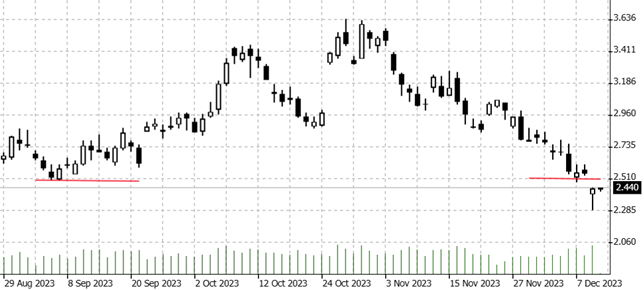

12.12.2023 – Just like the first snow at the end of November, the price of natural gas has melted away. It is too mild for a bull market, not only in Europe but also in the USA.
The bears have been celebrating their feast for weeks: high inventories and weather forecasts predicting a much warmer winter than usual have sunk prices. Here is the daily chart of US gas. From a technical point of view, an important support level of around 2,550 dollars per million British thermal units (MMBtu) has been broken – the next stop will probably be 1,950, according to the experts at economies.com. We are more likely to see 2,510/2,500 (see red lines), but no matter – the trend is the same.

Source: Bernstein Bank GmbH
The weather website NatGasWeather.com commented on the latest events: “The weekend data failed to trend any colder with the setup through Dec. 26 suggesting warmer than normal temperatures and lighter than normal demand will continue through the end of the month.”
The storage tanks are full
In addition, the heating season in the US has started with the highest storage levels since 2020, as the U.S. Energy Information Administration (EIA) announced last week. Specifically, the storage volume is 5 per cent above the five-year average. The mild winter of 2023/2023 and increased savings on heating had already ensured a high fill level in gas storage facilities. As a result, the tanks were 19 per cent fuller on 1 April than in the previous five years.
China and the Saudis
And then there is the UN Climate Change Conference COP 28, where there was a lot of talk and concrete action remains to be seen, but for the first time, Saudi Arabia, a major gas producer, has tentatively supported the willingness to reduce the use of fossil fuels, as the website “FXStreet” explained. Furthermore, fears of deflation in China – i.e. a recession – are spreading, which is likely to significantly reduce demand for liquefied natural gas.
Our conclusion: There are currently hardly any arguments in favour of a new natural gas boom. It is not only in this country that people are holding back on turning up the heating, if only to reduce their dependence on Russia. Many households have switched to firewood and prices have roughly doubled since last year. And if it’s just as dingy and wet and cold as it is now, then simply wearing warmer clothes at home helps. We look forward to seeing what happens next and wish you successful trades and investments!
___________________________________________________________________________________________________________________________________________________________
The content of this publication is for general information purposes only. In this context, it is neither an individual investment recommendation or advice nor an offer to purchase or sell securities or other financial products. The content in question and all the information contained therein do not in any way replace individual investor- or investment-oriented advice. No reliable forecast or indication for the future is possible with respect to any presentation or information on the present or past performance of the relevant underlying assets. All information and data presented in this publication are based on reliable sources. However, Bernstein Bank does not guarantee that the information and data contained in this publication is up-to-date, correct and complete. Securities traded on the financial markets are subject to price fluctuations. A contract for difference (CFD) is also a financial instrument with leverage effect. Against this backdrop, CFD trading involves a high risk up to the point of total loss and may not be suitable for all investors. Therefore, make sure that you have fully understood all the correlating risks. If necessary, ask for independent advice. CFDs are complex instruments and are associated with the high risk of losing money quickly because of the leverage effect. 68% of retail investor accounts lose money trading CFD with this provider. You should consider whether you understand how CFD work and whether you can afford to take the high risk of losing your money.7
